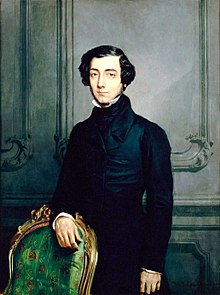 |
| Alexis de Tocqueville |
Maureen Dowd wrote an op-ed framed by an interview with an outgoing French diplomat. In it, she quotes the diplomat invoking a Chinese proverb:
‘When the finger is showing the moon, the fool is looking at the finger and the wise man at the moon.'
Hmmm. Seems like it was written for me. I've been busy looking at our president giving us a finger. What is he pointing at?
His success in the last election seemed to pivot on promises, some of them quite vague, to gut Obamacare, stop illegal immigration from Latin America, improve trade with China and others who were trying to bilk us, and . . . uh . . . oh, and lock up Hillary.
Tax cuts. Yes, that's right, there were promises of tax cuts.
There was something about making America great again in there too.
A critical mass of people felt something important in those promises. That's the moon I guess. That many Americans saw in these promises a balm for what was wounding them.
I can't help but observe, though, that many of those who supported him have nothing to lose with some of those promises. Those on Medicare don't need to worry about the consequences of gutting Obamacare. Citizens have no worry about being deported in a crackdown on illegal immigrants. Whether or not Hillary goes to jail won't affect anyone's well being aside from the accused. What's there to lose by trying to reclaim some nostalgic yesteryear?
The other promises might not fit with this theme so well.
There might be something to this asymmetry between what constituents could lost, what skin was in the game, and what one looked for in the promises made by this candidate.
I need to think on this some more.





